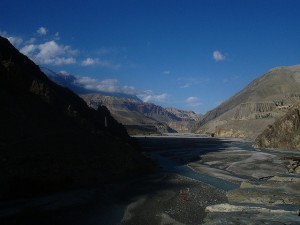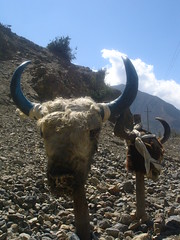 Normally I am droopy eyed and senseless in the mornings but the views from the sun room at the top of the aptly named Niligri View guesthouse have roused me from my usual sloth and I am wide awake.
Normally I am droopy eyed and senseless in the mornings but the views from the sun room at the top of the aptly named Niligri View guesthouse have roused me from my usual sloth and I am wide awake.
Is there any better start to a day than to sit in the warmth of the sun, sipping hot lemon and ginger tea, and gazing up at a clear blue sky and snow capped mountains?
I cannot think of a better start myself.
I want to sit there, feline-like for a good few hours but alas it’s time to get to grips with the morning. Which is a shock to the system after all that languid luxury, because as soon as we head out of the hostel the trail greets us right at the door and rises upwards, almost vertically for a good few hundred metres.
With heavy morning legs and a belly full of honey and Tibetan bread, it’s hard going.
All I can think of as I trudge upwards is that an hour earlier I’d been snug in my sleeping bag and now, here I am scrambling up a scree path. My leaden legs struggle to warm up and accept their fate.
Still, after twenty minutes or so, the morning sun and sense of purpose combine to energise me.
As we head up the path from Kagbeni to join the main trail that leads to Muktinath, the lines of pilgrims before us seems longer than ever, and the path feels more like a major road, filled as it is with people and mules all eager to press on to the final destination.
High above Kagbeni we stop for a while to rest up and take in the stunning view of the river valley below us.
It’s only here that I realise just how amazing Kagbeni really is. Surrounded by desolate, harsh mountains, the little village seems to be a remote little outpost of fertility and plenty in what is otherwise a foreboding and barren landscape. A little miracle really.
But there is no time to dally, the path to Muktinath stretches out ahead, and it is busy and bustling.
I wonder where they all came from, these crowds.
For most of the trail we’ve been walking in our little group and have rarely met up with other people going in our direction.
Now it seems as though a swarm of bodies has descended on the trail, and is heading for the temple.
Puzzling.
It makes for quite a festive atmosphere though, and the sense that we are all so close to the end seems to buoy everyone up and add a spring to our steps.
So we march on.
Along the way, the trail is peppered with little tea houses and one in particular seems to be attracting ample attention. It is only when we are sitting down that I realise why it is amusing the crowds.

For ss I look around I come face to face with two gaping holes staring back at me, vacant and garish. I stifle a laugh of horror as I realise that I am looking into the gaps where eyes had once been.
Two yak heads, fixed to a couple of tree stumps, act as the sign post for the tea house and are proving quite an attraction.
They are strangely impressive with their erect, slightly menacing horns and those dead, vacant, sockets.
I suck down some water and gaze at their dessicated bones, unsure what to think, or at least unwilling to acknowledge what it is I am thinking.
Because the day is so yellow, the sky so blue and ahead of us the village of Jharkot already looms above, its impressive terracotta coloured temple sitting precariously on an outcrop of rock some 3500 metres high.
Those yaks may be long gone, but I for one am right here in it and loving every minute.
Jharkot, as it turns out, is a terrific little town. It boasts very lush orchards ( so fresh delicious cider is the order of the day) and is surrounded by fields of millet and corn.
As you walk into the town, you are greeted by a host of women selling bright beads, colourful scarves and cheerful knitwear and the temptation to stop and barter is quite overwhelming.
But we resist and manage to push on through town, our destination so close now that the urge to arrive obliterates all other desires.
The last few kilometres however are energy sapping.
The altitude isn’t so much the problem (at under 4000 meters things aren’t that bad), but the relentless, slow climb for most of the day seems to hit me and I slow down the last kilometre to a pace that even my granny would have been ashamed of.
And then, ahead of me is the gateway to Muktinath at last and beyond that the Hotel Dreamhome (“Whenever you room there is no place like Dreamhome”).
It is only then that I notice the people around me again, the cheerful crowds of tourists and pilgrims, all happy and elated, each for their own reasons.
All around me there is a festive hustle and bustle of people.
Crowds stand around talking, catching up with one another it seems, now that they are all reunited in town.
Street vendors vie for attention, keen to sell me a whole host of multicoloured souvenirs and whatnots.
Prayer flags are fluttering everywhere and above the din the occasional sound of a loom clattering can be heard.
And at the far end of town, the temple rises up, white and majestic.
We head there in the evening, tired and subdued.
This is the temple of fire and water where the pilgrims come to bathe in the holy waters and pay homage to the eternal flame (a natural outlet of gas).
It is a truly peaceful place, and I feel very at ease as I walk around the orchard garden and marvel at the views and the temple buildings.
It’s not until I get to the room housing the flame however, that I get a true sense of what it means for the pilgrims who come here.
If it is ever possible to get such a true sense when you are not a follower of a religion that is.
The room itself is warm and very dark and the alter itself seems to loom over the visitor in an intimidating way – the heat and the darkness seeming to conspire to produce this effect.
I am standing there supposing that, for a religious person, my sense of unease would be supplanted with something akin to awe, when I notice a very old woman kneeling at the foot of the alter and chanting praying/ thanking/beseeching.
She seems close to tears and truly awestruck by the moment. Momentarily separated from her surroundings, it is just her and her God that exist.
Out of the corner of my eye I catch a blue flame fluttering – the source of her devotion. A thing whose power and meaning I can in no way fathom.
And suddenly I need to escape. I feel like some dilettante, some ignorant intruder.
I bow out of the door, silenced and embarrassed, glad to have witnessed her devotion, but humbled by it at the same time.
We have each made our journey here to this magical place, and while I am glad to have accomplished it, I realise that my place is not here among the devout and the holy, but down below in the town with the tourists, and the beer and the cards and the singing…